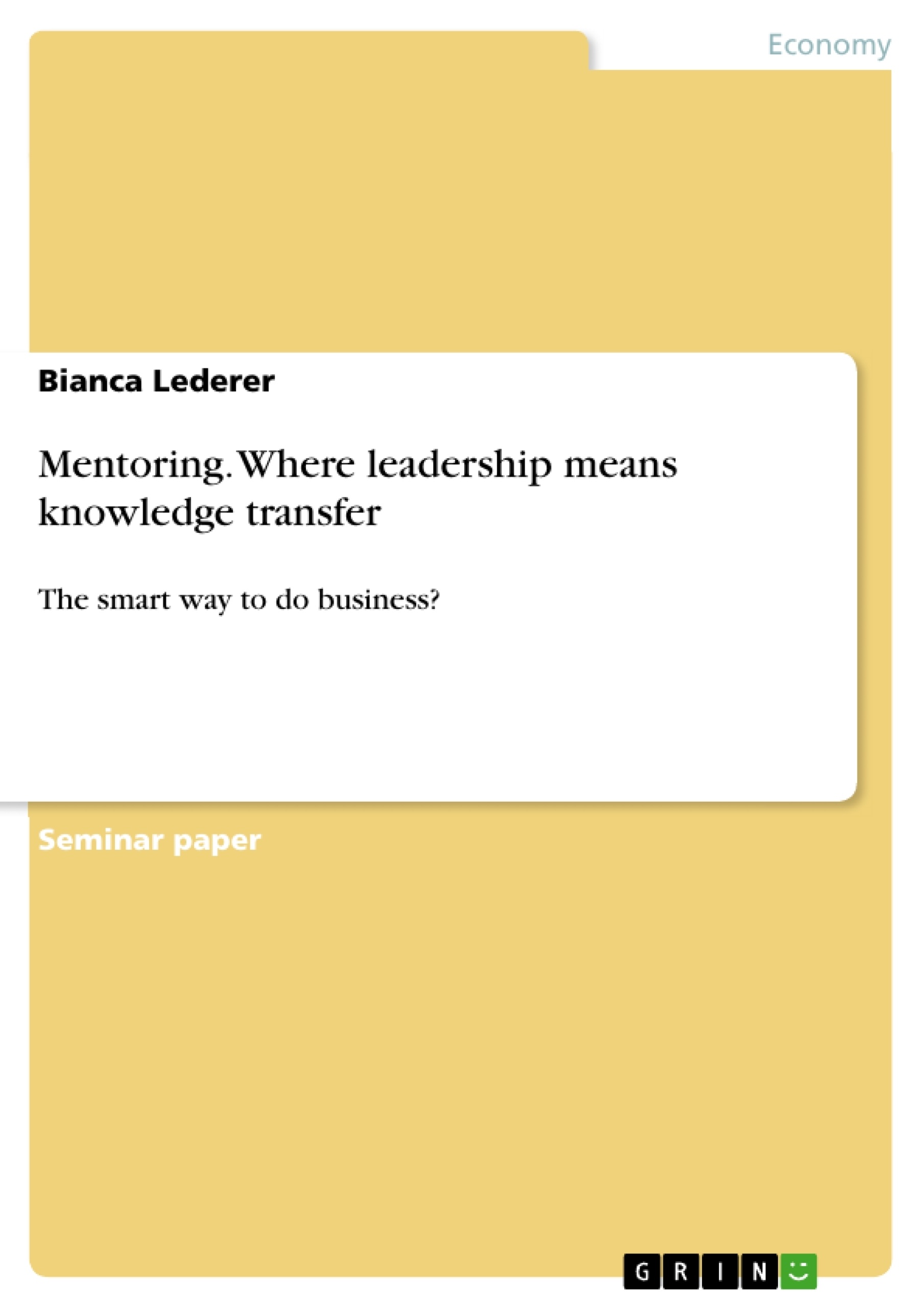This assignment deals with the thesis ‘’Mentoring: where leadership means knowledge transfer’’. Mentoring through leaders has become a more and more popular approach to establish knowledge transfer and relationships within a company. All parties, the organization and the mentoring pair, can benefit from mentoring programs.
Mentoring comes along with different chances and challenges, which need to be taken into consideration upon the implementation of a mentorship program. In case an organization decides for mentoring, it is not only about the implementation but as well its sustainability.
A practical example, where mentoring has been successfully implemented, is the ‘’Elevate: Executive Mining Mentorship Program’’ of PWC. It outlines that mentor and mentee have to be open for such a relationship and bring certain requirements for successful paring.
Mentoring has overcome its phase of simple knowledge transfer by leaders to passive mentees. It has become process-orientated which means that mentees also discuss what they learn with their mentors through critical analyzes. In the future, mentoring programs might even get more popular and being implemented in further companies due to the fact that the current mentoring pairs are willing to pass on their positive experience with mentoring to other individuals. For organization this means that they can keep and transfer their knowledge as well as get the best out of their employees in regard to their individual skills. This enables efficient working for staying competitive.
Inhaltsverzeichnis (Table of Contents)
- Executive Summary
- Table of Contents
- List of Abbreviations
- List of Figures
- 1 Introduction
- 1.1 Problem statement and objective
- 1.2 Research methodology and structure
- 2 Business Context and organizational drivers for mentoring
- 2.1 Definitions of leadership, knowledge transfer and mentoring
- 2.2 Advantages and disadvantages of mentoring
- 2.3 Implementation of Mentoring
- 3 Practical example of PWC
- 4 Conclusion and outlook
- 5 Appendix
- Bibliography
Zielsetzung und Themenschwerpunkte (Objectives and Key Themes)
This assignment explores the thesis that "Mentoring: where leadership means knowledge transfer". The paper argues that mentoring programs, particularly those led by experienced leaders, are effective methods for establishing knowledge transfer and fostering relationships within organizations. Both the organization and the mentoring pairs can benefit from these programs.
- The advantages and disadvantages of implementing mentorship programs.
- The importance of sustainability and careful implementation of mentorship programs.
- The evolution of mentoring beyond basic knowledge transfer to include more process-oriented approaches.
- The potential for increased popularity and implementation of mentorship programs in the future.
- The role of mentorship in organizational knowledge retention and employee skill development.
Zusammenfassung der Kapitel (Chapter Summaries)
The introduction outlines the problem statement and objective of the assignment, which is to explore the relationship between leadership and knowledge transfer through mentorship. The paper also discusses the research methodology and structure used.
Chapter 2 delves into the business context and organizational drivers for mentoring. It defines key terms such as leadership, knowledge transfer, and mentoring, and analyzes the advantages and disadvantages of implementing mentorship programs. This chapter also explores the process of implementing such programs.
Chapter 3 provides a practical example of a successful mentorship program, the "Elevate: Executive Mining Mentorship Program" implemented by PWC. This example highlights the importance of mentor and mentee openness and specific requirements for successful pairing.
Schlüsselwörter (Keywords)
The key terms and focus topics of this work include leadership, knowledge transfer, mentoring, organizational development, employee development, program implementation, sustainability, and practical examples such as the PWC mentorship program.
Frequently Asked Questions
What is the main thesis of this assignment on mentoring?
The thesis is that mentoring is a form of leadership where the primary goal is knowledge transfer and relationship building within a company.
How do organizations benefit from mentoring programs?
They can retain knowledge, develop employee skills individually, and stay competitive by optimizing their human resources.
What is the "Elevate" program by PWC?
It is a practical example of a successful Executive Mining Mentorship Program that demonstrates effective pairing of mentors and mentees.
What are the requirements for a successful mentorship?
Both mentor and mentee must be open to the relationship, committed to the process, and meet specific criteria for successful pairing.
How has mentoring evolved over time?
It has moved from simple, passive knowledge transfer to a process-oriented approach involving critical analysis and two-way discussion.
- Quote paper
- Bianca Lederer (Author), 2015, Mentoring. Where leadership means knowledge transfer, Munich, GRIN Verlag, https://www.grin.com/document/317771



